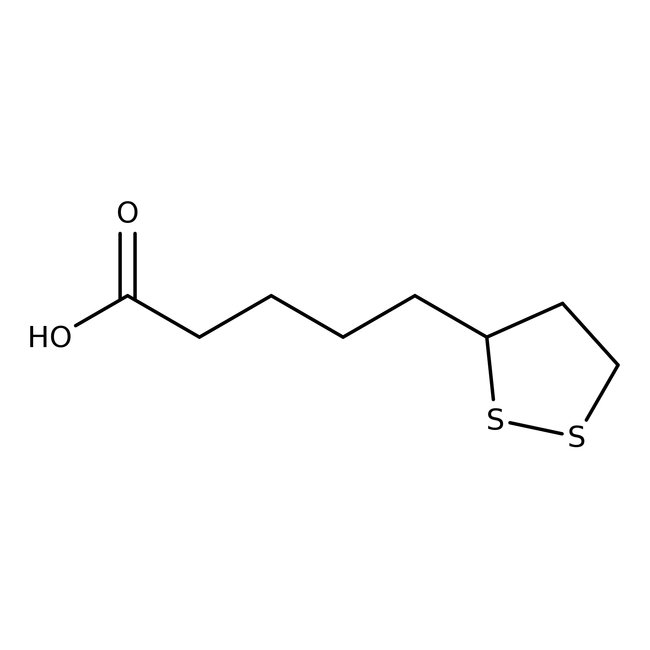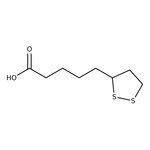Search Thermo Fisher Scientific
DL-Thioctic acid, 98%, Thermo Scientific Chemicals
H302-H315-H319-H335
Harmful if swallowed.
Causes skin irritation.
Causes serious eye irritation.
May cause respiratory irritation.
This Thermo Scientific Chemicals brand product was originally part of the Alfa Aesar product portfolio. Some documentation and label information may refer to the legacy brand. The original Alfa Aesar product / item code or SKU reference has not changed as a part of the brand transition to Thermo Scientific Chemicals.
General Description
• DL-Thioctic acid derives from octanoic acid, and it has been described as an antioxidant coenzyme important for the activity of enzyme complexes including pyruvate dehydrogenase and glycine decarboxylase
Application
• DL-Thioctic acid has been used in studies to increase insulin sensitivity and stimulate glucose uptake into adipose and muscle cells in vitro
• DL-Thioctic acid has an essential role in aerobic metabolism
• It has been used as free radical scavenger compound
• It can also assist in repairing oxidative damage via the increase of endogenous antioxidants, including vitamins C, vitamin E, and glutathione
• It can induce apoptosis through caspase-independent and caspase-dependent pathways, a process mediated by intracellular Ca2+
• DL-Thioctic acid has the ability to impact various cellular biological pathways since it can increase glutathione synthesis and modulate transcription factor activity, mainly nuclear factor kappa B (NF-κB)
• It can decrease the phagocytosis of myelin by macrophages
General References:
- Jia, W.; Ling, Y.; Lin, Y.; Chang, J.; Chu, X. Analysis of additives in dairy products by liquid chromatography coupled to quadrupole-orbitrap mass spectrometry. J. Chromatogr. A 2014, 1336, 67-75. Sumathi R, Baskaran G, Varalakshmi P. Relationship between glutathione and DL alpha-lipoic acid against cadmium-induced hepatotoxicity. Jpn J Med Sci Biol. 1996, 49, (2), 39-48.
- Karaoglu, E.; Baykal, A.; Erdemi, H.; Alpsoy, L.; Sozeri, H. Synthesis and characterization of dl-thioctic acid (DLTA)-Fe3O4 nanocomposite. J. Alloys Compd. 2011, 509 (37), 9218-9225.
- Fiedler SE, Spain RI, Kim E, Salinthone S. Lipoic acid modulates inflammatory responses of monocytes and monocyte-derived macrophages from healthy and relapsing-remitting multiple sclerosis patients. Immunol Cell Biol. 2021, 99, (1), 107-115.



